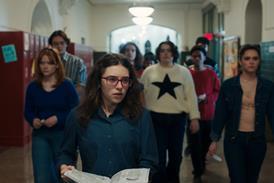The second edition of the Mumbai Film Mart (MFM) wrapped on Sunday with no deals announced, but participants reporting they were happy with the results. The market was held during the Mumbai Film Festival, which also raised the issue of film restoration over the weekend.
Attendees at the three-day MFM (Oct 19-21) included high-profile buyers of Indian content such as Japan’s Nikkatsu and Happinet Corp, Germany’s Rapid Eye, Hong Kong’s Edko Films and Taiwan’s Khan Entertainment.
Indian buyers were also present to interact with international producers such as France’s Les Films Du Losange, Italy’s Fandango and US sales agent Visit Films. Held on the top floor of the Trident Hotel, the market was timed to run over the weekend to ensure more local film execs would attend the event.
Both the Mumbai film festival and market are backed by Reliance Entertainment; indeed many of the attendees were regular buyers of the Indian studio’s product, but Reliance’s major competitors including Eros, UTV and Viacom 18 were also pitching to buyers in the top-floor room.
“[MFM] is a great help for me - the fact that I can meet the studios to catch up and meet some producers in one room is such an achievement,” said Rapid Eye’s Stephan Holl, who is releasing Yash Chopra’s upcoming Jab Tak Hai Jaan in Germany, day-and-date with India (Nov 13).
“On top of that I had the chance to run into interesting filmmakers and independent producers instead of wasting time driving around Bombay for meetings. More market screenings would definitely help.”
Telewizja Polska’s Aleksandra Biernacka said: “I think this event has a lot of potential - they’ve brought in a lot of interesting local industry people for us to meet. It’s good to talk to local producers directly as in the past we’ve often gone through intermediaries.”
Meanwhile, the festival held a panel on film restoration and preservation on Sunday (Oct 21) with speakers including The Film Foundation’s Margaret Bodde, Cineteca di Bologna’s David Pozzi and Mike Pogorzelski, who heads film archives for the Academy of Motion Picture Arts and Sciences.
The wide-ranging discussion revealed how much of India’s cinema heritage is in danger of being lost - from a total of 22,000 films produced over 100 years, around 5,000 films have already disappeared and around 10,000 are in urgent need of preservation.
Pozzi spoke of the immediate need to make copies of any negatives that are in danger of disintegrating beyond repair; then archives and rights holders can worry about restoration later. Both Pozzi and Bodde spoke of the importance of archiving prints as well as digital copies of each film.
“There’s no life span for digital…the best recommendation is to output to film. It’s really the only thing that ensures survival,” Bodde said.
“In India, we don’t understand the concept of preservation,” said Indian filmmaker Shivendra Singh Dungarpur, who has made a documentary on the subject, Celluloid Man. “So far it’s all been about scanning and putting films on DVD. [Bollywood classic] Sholay is not in an archive because the producer feels the film is still making money and archiving is like killing it - we need to break that concept.”
Pogorzelski spoke about the Academy’s attempts to rescue the films of Indian master Satyajit Ray. “My predecessor Michael Friend came to India to track Ray’s work - and found several films were in serious danger of deteriorating.” Several institutions including Scorsese’s Film Foundation are now collaborating to restore around one Ray film a year.
Speaking from the audience, Indian filmmaker Dev Benegal stunned the panellists by revealing that he had once found a print of Ray’s Kanchenjungha rotting under the producer’s bed. Pogorzelski said the Academy had been trying to locate the film for several years.
The panel coincides with a special section of Restored Classics screening at the festival, including The Leopard, Once Upon A Time In America, Carmen Goes Home and Indian classic Kalpana.





















No comments yet